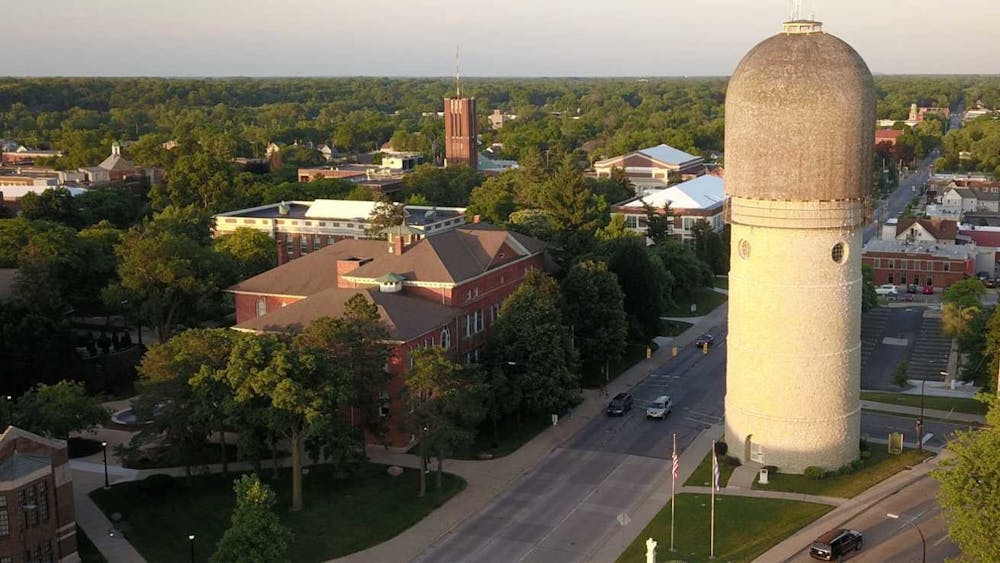Sai Priya Marrapu landed in Detroit, Michigan at 5 p.m. on Aug. 17 after a dreadful and hectic 28-hour flight from Hyderabad, India. Overwhelmed with all sorts of emotions after leaving her parents and home, she still had a strong desire to further her education.
“My father [wasn’t] willing to let me go,” Marrapu said. “It’s a mixed feeling I can’t even explain because you feel so heavy inside, you are coming to a foreign country, you don’t know anyone there and my first time traveling alone.”
Shortly after earning her doctorare for pharmacy and taking multiple exams to be able to study abroad, she found herself applying to Eastern Michigan University’s clinical research program on Jan. 5 - six months prior to the start of the fall 2017 semester. She then got an acceptance from EMU after two months and started the process of obtaining her five-year student visa.
“I worked so hard to get to the U.S.,” she said. “There is a lot to come to here and you have to start working one year before coming.”
According to the Institute of International Education, the number of international students increased by 3.4 percent in the 2016-2017 year. That is 85 percent more international students studying at U.S. colleges and universities compared to a decade ago.
Marrapu is only one of the million of international students enrolled in U.S. higher education. Her story and struggles is just one of the many that attend Eastern Michigan University.
A skeptical opportunity
According to EMU’s office of international students and scholars website, about 400 new international students come to EMU to study every year, and there are approximately 1,000 international students that call the university home. Students come from 87 countries and study at the graduate and undergraduate level.
Tariq Mosawi, 25, has been studying in the United States for over four years. He remembers how excited, yet terrified he felt before coming to America.
“I was watching the news all the time so I can do my research and see how America is and based on what I’ve seen, there is a lot of discrimination and racism based on colors,” Mosawi said. “I was happy to be in the U.S. but terrified because I’m from the Middle East and I’m black at the same time so I don’t know what I’m going to face.”
According to the 2016 Federal Bureau of Investigation’s Uniform Crime Report, 58.9 percent of the victims were targeted because of the offenders’ bias against race/ethnicity/ancestry and 21.1 percent were victimized because of bias against religion.
The daunting language
Like Mosawi, 22-year-old Alyssa Chu is from Malaysia and has been studying in the United States for about four years. But compared to Mosawi and Marrapu, she didn’t find herself too out of place having both of her parents as EMU alumni. However, she definitely found herself struggling with the common language barrier most international students tend to face.
“I don’t say my english is weak. But when I first came here, I had the anxiety of speaking english because I don’t think people don’t understand me but because of how the american accent is, it is hard for americans to hear the foreign accent.” she explained.
Director of International Students and Scholars Esther Gunel said international students may use English back home, but the English is different in other countries. They may use British English, Australian English, or Canadian English.
Because of the intense culture shock and language barriers, international students often find themselves struggling to make friends and converse with domestic students. According to the University of Washington’s “International Student Struggles” page, “students reported feeling some form of social isolation and loneliness.”
With Marrapu only being in the United States for a total of four months, she often felt depression symptoms because she couldn’t find much in common with other people.
“We don’t understand what you actually do and what you actually like,” Marrapu said. “Even to start a friendship, we should have some common qualities but we don’t have anything in common because eat different, we speak different, we dress different.”
On the Institute of International Education’s “Leading Place of Origin” 2015 to 2016 statistics, the United States gets many international students and scholars from China, with India as the second highest.
Mosawi came to the United States not knowing any English at all. He only knew very little but was determined to learn it in his first year in the United States with his teacher. He even went through the extent of not associating himself with anyone that from Saudi Arabia, or spoke Arabic to achieve his goal of understanding English as fast as he can. He felt that it would be disappointing and a waste of time if he went back to Saudi Arabia without knowing English.
“I came here with no English at all so it was kind of difficult because at that point I only knew three English words -- yes, no, and cheeseburger,” he said. “It took me six months, but I was highly motivated to go through the whole process.”
Director Gunel said many students struggle with language and simply don’t understand how to reply in certain situations, especially when ordering food.
“I remember I talk to some students they say ‘when I first came to this country my friend told me if you’re hungry, always remember one word -- cheeseburger,’” Gunel said.
She mentioned that American culture is all about choices but to someone that has never been to America and not used to having this many choices, it is chaotic and “they try to survive in this chaotic situation and still manage with language, culture differences, and loneliness.”
Finding the niche
Although all international students have their own unique stories on coming to the United States and facing their fair share of culture shock, they find their niche during their time.
In the four months Marrapu was here, she finally started to understand English a lot more and began to reply very well, even when people spoke fast.
Alyssa Chu had a goal of becoming president of something to actually being president of the International Student Association (ISA), while Tariq Mosawi became well-known around campus and ISA Treasurer.
“I started to get recognized around with all the fun and energy I bring and basically everyone wants to be my friend and now I’m kind of like the face international people,” Mosawi said. “And I am the treasurer of the ISA, so I started from nothing to the face of international.”









